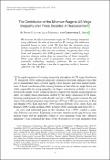The Contribution of the Minimum Wage to US Wage Inequality over Three Decades: A Reassessment
Author(s)
Autor, David H.; Manning, Alan; Smith, Christopher L.
DownloadAutor_The contribution.pdf (933.8Kb)
PUBLISHER_POLICY
Publisher Policy
Article is made available in accordance with the publisher's policy and may be subject to US copyright law. Please refer to the publisher's site for terms of use.
Terms of use
Metadata
Show full item recordAbstract
We reassess the effect of minimum wages on US earnings inequality using additional decades of data and an IV strategy that addresses potential biases in prior work. We find that the minimum wage reduces inequality in the lower tail of the wage distribution, though by substantially less than previous estimates, suggesting that rising lower tail inequality after 1980 primarily reflects underlying wage structure changes rather than an unmasking of latent inequality. These wage effects extend to percentiles where the minimum is nominally nonbinding, implying spillovers. We are unable to reject that these spillovers are due to reporting artifacts, however.
Date issued
2016-01Department
Massachusetts Institute of Technology. Department of EconomicsJournal
American Economic Journal: Applied Economics
Publisher
American Economic Association (AEA)
Citation
Autor, David H., Alan Manning, and Christopher L. Smith. “ The Contribution of the Minimum Wage to US Wage Inequality over Three Decades: A Reassessment † .” American Economic Journal: Applied Economics 8, no. 1 (January 2016): 58-99. © 2016 American Economic Association.
Version: Final published version
ISSN
1945-7782
1945-7790